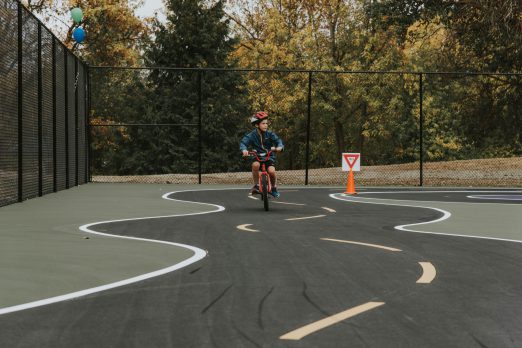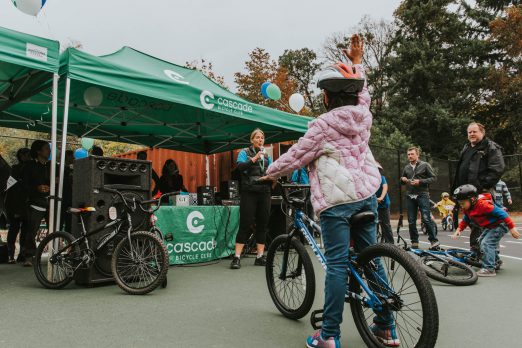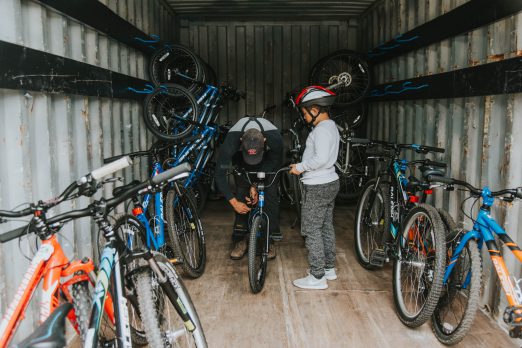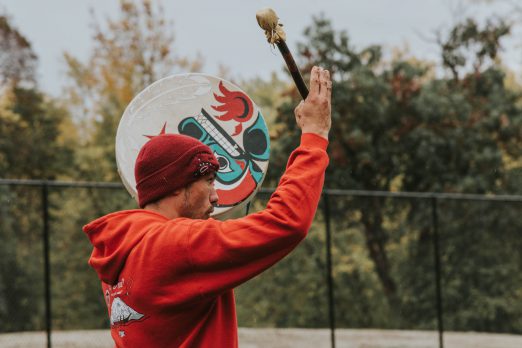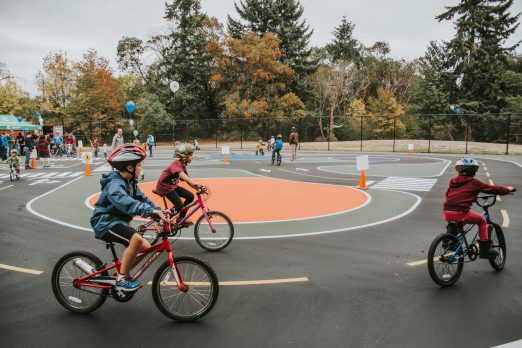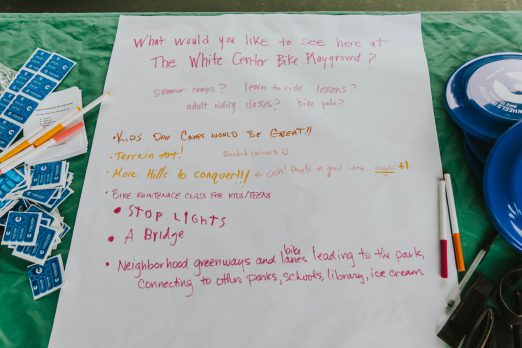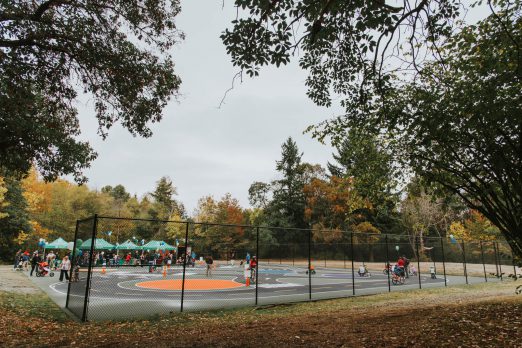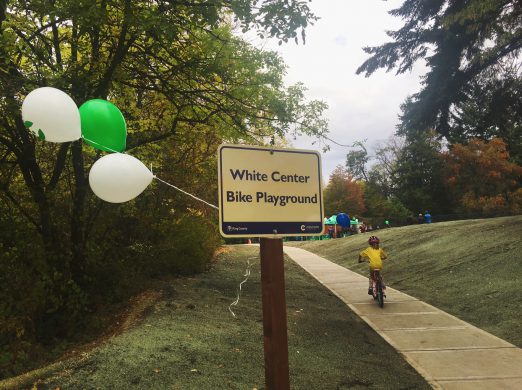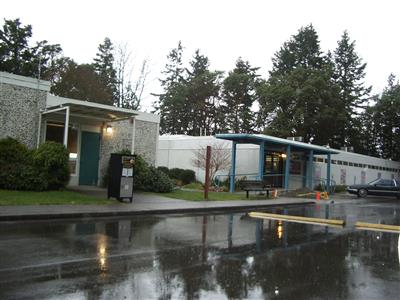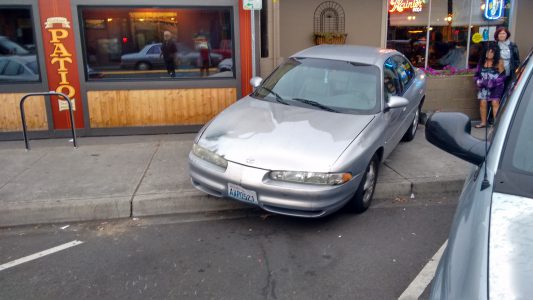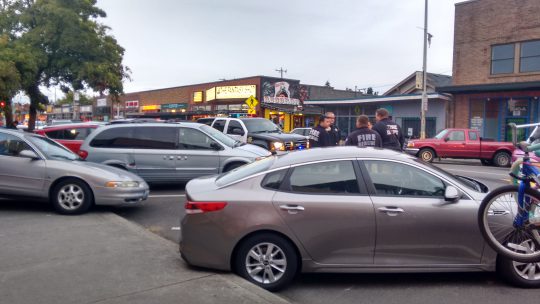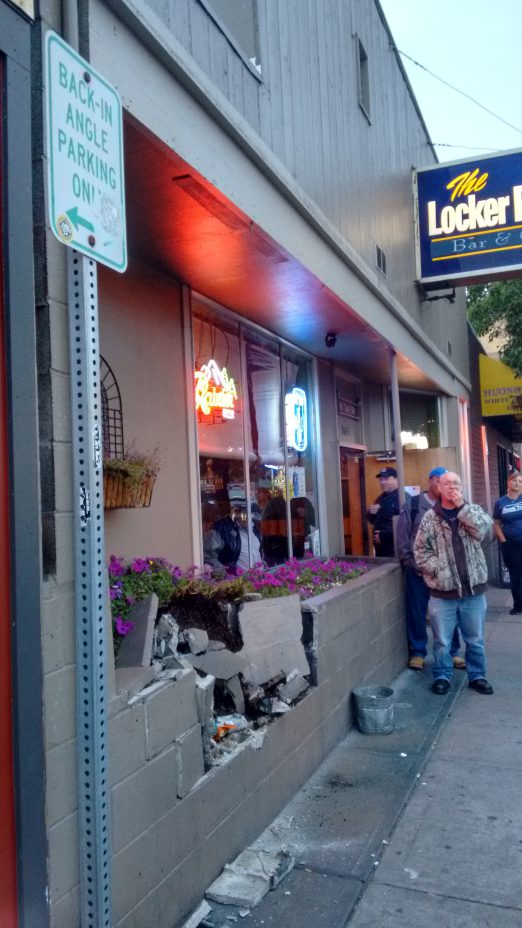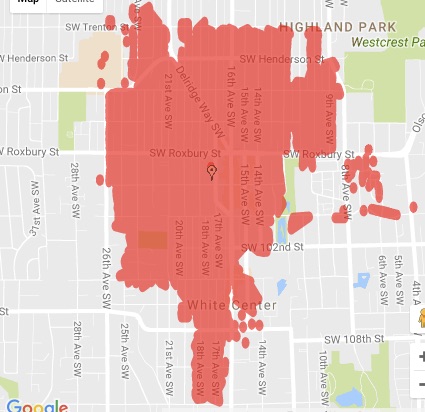(Added early Friday: Unedited WCN video of meeting, in its entirety)
By Tracy Record
White Center Now editor
King County promises a second community meeting about its uncloaked-at-the-last-minute plan to open a 70-bed shelter in White Center.

That followed a tense and intense standing-room-only meeting with more than 100 people, many furious and frightened, saying the shelter proposed for the former Public Health building at 8th and 108th is too close to schools, too close to homes, simply the wrong location.
Some declared they will do whatever it takes to stop it, and were talking about protests and crowdfunding for legal action.
Here’s how the 2 1/2-hour meeting – an hour longer than originally planned – unfolded in TAF’s Bethaday Community Learning Space, close to the location where the county says it wants to open the shelter by November 1st.
The meeting was moderated by Michael Ramos of the Church Council of Greater Seattle, who opened it reiterating that the most-recent One Night Count found 10,000 people unsheltered in King County. It is a “there but for the grace of God go I” situation, he stressed. He said he is part of the All Home coalition that works on the homelessness crisis. “With supportive services, this can be a place of hope and healing for the community.” He promised comments and questions/answers will be “audio-recorded” with an FAQ posted on King County’s website.
The county “is determined to hear” what those in attendance have to say, Ramos promised while trying to set ground rules for the discussion. One man said that he felt it was somewhat disrespectful for the meeting organizers to even have to suggest such rules might be needed.
Next to speak, Mark Ellerbrook, the King County official, to whom we spoke for the preview story we published on Tuesday. “The need in this community is very real,” he declared. Ellerbrook reiterated that Southwest King County has the largest number of people living outdoors outside Seattle – at least 100 estimated to be in White Center, sleeping in doorways, parks, other places. Calls to 211 numbered more than 1,300 for the three zip codes that cover the greater White Center area. “There is no shelter” in this area, he again declared, aside from small shelters for women in West Seattle and Burien. The county looks at where it needs services, and this area qualifies, he said. So, they started looking at where they could provide services, “and move (people) into housing.”
As he had told WCN in our interview, the shelter will operate 5 pm to 8 am. Ellerbrook handed the microphone to Maj. Smith and Scott Morehouse from the Salvation Army.
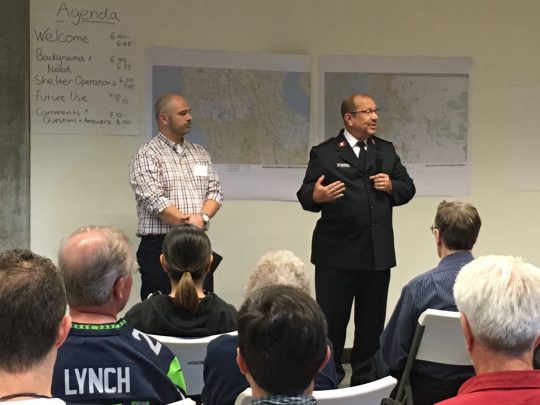
Smith said he has “been doing this a long time” – involved with shelter, addictions, and is Director of Social Services in the Seattle area. “Our flagship programs have become our shelter operations.” Up to 230 beds at three locations comprise the programs right now, he said, and Morehouse is the manager; he said he’s a “member of the White Center community.”
After their short intros, the microphone was handed to Steve Daschle of Southwest Youth and Family Services, a West Seattle-headquartered nonprofit. As he had told the North Highline Unincorporated Area Council months ago, his organization and others are looking at a potential development at the site of this emergency shelter and the neighboring White Center Food Bank. “We have a vision .. of a community service center that could serve White Center and Southwest King County,” working with the WCFB and White Center Community Development Association. In addition to that, they are talking with Capitol Hill Housing to provide “several units of housing” on that site, but he said it’s still early – at least two, three, four years before the building could be built, “a brand new, beautiful resource for the community.”
First person to ask a question was Bobby Beeman of Sky’s Barber Shop and the White Center Chamber of Commerce, asking why White Center businesses hadn’t been notified until just a few days ago.
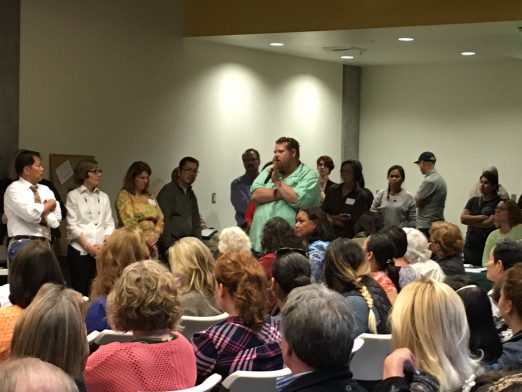
He said that WC residents seem to believe that businesspeople are “pushing homeless people” from the business district, into residential areas. “I happen to know that the 300 or 400 people you talk about in White Center, if you go out and had conversation with the people you seem to want to help and ask them what they needed, you’ll find that they prefer to be on the fringe, that they don’t want (what) you are going to offer them.” He also brought up what King County’s Ellerbrook had said, that they operate regionally so people don’t have to be from White Center to use a WC shelter, and so on.
Ellerbrook said yes, that’s true, and said that outreach workers try to build relationships with people to bring them in and help with their issues and while it might not click the first time, it eventually does.
Beeman pressed him on the point of the county suggesting that the business community supported this. Ellerbrook said that they had heard “in various meetings” and then said, “I apologize for” not reaching out directly to businesspeople, and he reiterated that they had distributed notices within 500 feet of the planned shelter.
Next person to speak says the intersection “with four schools” is one of the busiest, most dangerous in the area, and he’s concerned that those schools all will be starting around the time that the shelter sends people out for the day. He said that “We’re not going to stand for this to come into this place, if we have to place a human barrier in front of it.” He vowed to inundate the county with e-mails “because we’re not going to have this.” He also said planning for the facility allegedly began a year ago and there wouldn’t even be a meeting tonight if WCCDA’s Sili Savusa hadn’t told the county they had better talk to the community.”
Next, two people who said that transients go by their house and throw trash into their yard, and that a fire was started.
“Send them to Bellevue, send them to Kirkland!” he and his wife shouted, with supportive shouts coming from the audience.
Next, a woman from the Coalition on Homelessness said the problem is that there are people who have nowhere to go. This facility will offer evening and morning meals, which will allow people more time “to work on their jobs.” Many people sleeping outside do work, she said. “I want to call attention to the fact that the people living outside are human beings like the rest of us, we are all people. They are (also) residents of this community.”
“No, no, no,” yell some in the audience.
The advocate said it’s important that people realize drug and alcohol problems are not limited to unsheltered people. “We are talking about people who might have lived in your community before and lost their homes because they lost their jobs.”
“Do you live in White Center?” someone hollered from the audience.
Next person to speak identified herself as an Arrowhead Gardens resident. She said, “We have two encampments next door and we are comfortable with those encampments … When you talk about drugs, you will note that the people who are living there have a sign that says ‘no drugs allowed'” – she appears to be speaking about Camp Second Chance – and she goes on to say it’s important “that you don’t lump all people who are homeless as (if they are) a monstrosity.” She closes by reading a few lines of poetry.
Next speaker is a woman who identifies herself as a mom, and says this is “kind of unexpected.” She voices concern about children walking to school. She wonders why this location and not one that is more out of the way. Ellerbrook answers the question and says that the layout of the building works well for the various types of people they hope to serve, and reiterates that it’s a “temporary use of a county facility that’s vacant at the moment.”
Then a woman who says she is a White Center “building owner” and married to a business owner says she “cleans my parking lot almost every day,” scrubbing away excrement, picking up needles, bottles, cleaning out graffiti. She says she’s concerned that there’s no limit on nights that people can stay. “What incentive are we giving them … it sounds like enabling … I don’t mean to lump this population with going to get loaded, shoot up, stumble into the shelter … this should be a give-and-take and it sounds like take, take, take.” She thinks people using the shelter should have to show proof they are looking for work and trying to better their circumstances. “What are they going to change?”
Ellerbrook: “If we provide a shelter with barriers – they don’t come indoors. If it’s a low-barrier shelter, we get people to come in, and get them to address” their circumstances and challenges “and move into housing.”
Morehouse from the Salvation Army said that adding part-time case management increased “housing outcomes” at their downtown shelter by seven percent. “You said seven percent?” someone shouted, and someone else laughed.
Maj. Smith said that sheltering originally was about just keeping people from freezing to death on the street. “When you start to provide extended services … they will respond … they do respond. Not everybody responds, but those who do, we’ve seen them increase their ability to stabilize and access other services, and it’s a deterrent to the other things that the community faces … without that. … Intervention of this type leads to a decrease” in the problems. Smith mentions that the Salvation Army already has a nearby location (in South Delridge) where they can “engage” with the people who will be in this shelter.
What does “moving into housing” mean? someone asked. It might be “supportive housing,” Ellerbrook said. It might be “rapid rehousing.” But “we know that those folks who enter into housing stay in it for the long term.”
“Who pays for it?” someone asked loudly.
“So that doesn’t mean those people got on their feet,” said the person who asked the question.
A community member said she had been homeless and supports good programs, but she is concerned that this isn’t the best model, that people will just go out in the daytime and hang around in parks. “I don’t think we have the resources to provide public safety … I also have concerns about a faith-based model being used to support homeless people,” and she suggested other types of programs might help better with recovery.
Maj. Smith said that “being a faith-based organization is a lot different than providing faith-based services” – the programs are not faith-based, he said.
The next person mentioned Camp Second Chance (which is just inside the gate to the City of Seattle-owned Myers Way Parcels). “I asked them what they thought their solution would be … and it was that they can’t afford housing in Seattle. I said, ‘at least you’re not doing drugs here,’ and I got this deer in the headlights look, so I’m not so sure.” She went on to say that she has known methadone-using addicts and has had drug-using squatters on her property, and that the situation on Myers Way “has exploded this summer.” She said that opioid problems seem to be the root of the problem, and said that programs such as methadone and implants are keeping people addicted. She thought some different types of programs should be used.
Next speaker declared, “Communication is terrible, especially from King County, so since the county is going to do what it wants to do, regardless of the protest … what is it exactly that is going to happen to us in six weeks, so we know what to go to Joe McDermott and complain about?”
“We are going through the permitting process for ‘change of use’,” Ellerbrook said. “There are also improvements being made to the building – the fire panel, the facility generally, so it can be managed as a shelter. … This is the first that DCHS has heard (about the intersection concerns),” so they will go to the Roads Department about that. The concerns voiced tonight, he reiterated, will be posted on the county website.
Next, a woman who said she had been in human services for 10 years, “I am not unfamiliar, I have been in One Night Count, I have been out on the streets counting … I, as are (many others) here, am a homeowner, in Seola Gardens. We are a mixed-income community. Before the houses were built, we encountered some of the homeless (people) who would come take advantage of a safe haven that is there … we found many individuals who were opioid users, asleep on the vacant lots.” She said she was concerned about the central intake area, and who will be handling the data so that there are no longer people unable to access services. “How else is the county going to help with MIDD” – mental, instable, drug dependency.
Ellerbrook said that’s a levy that’s up for renewal right now, being considered by the County Council right now “that will be able to directly assist in this area.” Who are the other nonprofits that will be working with the shelter users? the woman asked again. Ellerbrook mentioned Sound Mental Health, as he had in our conversation earlier this week. Also: “One of the key interventions we will be using is ‘rapid rehousing’, to get people into housing quickly, for less cost than historically. … If we can get people into housing, they are successful in (staying housed).”
Besides Salvation Army and Sound Mental Health, he said “coordinated entry” would be done, including an initial assessment. “So if somebody presents at the shelter, they would get an assessment at the shelter … and they would be able to get a referral for housing, and that is managed by the county.”
The next speaker said, “I am excited for this … I think this is a good opportunity … I think (I am hearing) a lot of concern from the audience that we are not informed, that happens a lot in White Center… but … the numbers that we heard in the beginning, that there are 300 people in Southwest King County, unsheltered … the need is already here … we need to provide people a way to make better choices … I know that when I am rested and fed a little bit, I am able to think about things like my job …” He asked people to see people who might have the chance to make a transition.
After him, a man who said, “This is an enhanced shelter, which means no screening of occupants, people could show up drunk, stoned, they’ll be admitted – what about the people in there who are trying to get ahead?” And:”This is not about family homeless situations, this is about people who may not want to get help … it’s not for people under 18; existing felons or drug users can take advantage of this … it’s a regional (problem). These people can come from anywhere. … This is a main thoroughfare, it’s already been pointed out this is a dangerous intersection, I don’t want people squatting under my trees, parking their van in front of my house … this hurts the neighborhood, makes it more prone to crime, drugs, it’s not well thought out, you guys are shoving it down our throats. … This is not the right solution.”
Someone shouted from the back, “why not families?”
Ellerbrook replied that couples will be allowed in this shelter, unlike many. He didn’t answer why children would not be allowed.
Next: “We’re not necessarily opposed … we’re pissed off beyond belief that we’re just now getting to talk about it … we’re being told it’s opening November 1st without getting a chance to have a say. We’re not saying that homeless people are the worst of the worst, but 60 percent of them have alcohol, drug problems .. We want to get them help but we’re not being given the chance. Did you talk to the parents of (nearby schools)?”
No! shout many in the audience.
She says she has a daughter at Mount View Elementary and is worried that once the shelter users are sent out for the day, they’ll hang out in the area. The shelter operators will not know if any of them are sex offenders or have criminal backgrounds. “You have no respect for this community,” she shouts.
There’s no response to the statement, and many shout, “NO RESPONSE? ANSWER THE QUESTION!”
Ellerbrook says they reached out to the schools. Then a woman runs up to the front of the room and says she hasn’t been able to sleep for nights since hearing about the shelter plan, and that she talked to Highline Public Schools‘ security chief and that he told her he knew nothing about it.
The woman continues to shout that the children would be walking the same path as the people using the shelter.
One man in the back of the room shouted, “THERE WILL BE NO SHELTER!”
Another woman shouting from the side of the room demanded to know more about when there was alleged outreach to the schools.
Ellerbrook said he talked to a principal last week.
“LAST WEEK?” people shouted.
“You need to talk to the parents!” some shout.
“We will not let it happen! It will not let it happen!” people shouted.
Someone else shouted “GoFundMe page for an attorney!”
Answering a question from a few minutes earlier, Ellerbrook said that funding was planned for the shelter through 2017, and then part of it would be from state funds and “some of the other local dollars we use to provide shelter through the county.”
Next person to speak told those at the meeting that they “have done a pretty poor job” of getting information to the community. “That being said, these people who need the support and the services who are going to be offered at this place are already part of our community, they are already here, and I think there’s a great amount of evidence that these services are successful.” He wanted the Salvation Army to explain what kind of success they’ve said.
Morehouse said, “The people you come into contact with who access shelter and walk away as a success story, I wish we could tell you the numbers are huge … but we know that’s not really possible. What we are committed to is intervention, what we are committed to is trying to find resources for people, trying to help (them) on this almost impossible journey … If we don’t, who will?”
Next attendee said he has had to put up a fence on his property to keep transients away. He had trouble reaching someone in King County to listen to him. “I think you guys are confusing what the problem is.”
“The problem is that we have too many people here already,” someone said.
A woman said, “When you have children in this area, it’s location, location, location … when we call the cops every single night because there are people out back, couples out back, having sex, swearing, leaving needles, condoms, we can’t even have our grandchildren play at our home, when we can no longer use a park because all these people are going to be released out into the community … God bless the homeless, I wish I could give a home to everyone of them, but it’s this location, why could you not have chosen somewhere else? The complaint is location, we might as well be the third frickin’ runway here, we were not given any warning. … you can’t have a discussion for a year and then suddenly” bring it forward.
Pat Price from the North Highline Unincorporated Area Council said they received no official notification – it was brought up at their last meeting only because a NHUAC member lived close enough to get the notice about this. (And we should note, the only reason we heard about this is because we routinely cover NHUAC meetings, and are the only media organization that does that – we then had to work through the county to get the notice.) She asked if King County uses “its own Equity Impact Tool” or if it commissioned a housing analysis or opportunity mapping while planning this project. And Price wondered about the meeting notice’s mention that the community could suggest alternate sites.
“This is the worst site!” shouted someone in the back of the room.
Ellerbrook said they heard a suggestion for the DSHS building in downtown White Center, so they investigated it, but: “That’s been fully leased out to Sea Mar,” he said. A man in the back of the room said the county wasn’t aware of that previously.
The next person to speak said she felt “there should be a shelter somewhere in White Center – but, in a residential area, where there are homes north, east, south, west – children walk to school, my child, and it’s not as safe as it was when I used to walk to school – I’m glad this community is here today. These questions haven’t been answered to our community. Our community is suffering from this and we need to talk again. Homelessness in White Center is real … November is only two months away .. this community doesn’t really need a shelter in the residential area.”
Another woman says she found out about the meeting from a neighbor who works with the school district. “You should have had meetings when you started planning a year ago.” She said she had suggested previously that unused school buildings be used. If school district people had been notified back at the start of the planning process, they could have offered those suggestions.
Ellerbrook said they would take that suggestion under advisement as well as possibly changing the discharge hours at the shelter. Then people started shouting, that’s not the problem, it’s the location. Ellerbrook said, “Are there ways that we can mitigate the concerns?”
“No!” shouted many in the crowd.
Ellerbrook reiterated that people who will be served by the shelter are “in the community” now. “We will be doing outreach to those specific locations, to people who are already in your community, who are causing some of the issues (that people at the meeting have brought up).”
The next speaker identified herself as 26 years old and said homelessness has been an issue since before she was born, so, “What is the rush? … If these resources haven’t been available before this, then why are we rushing something that clearly the community is not on board with? This is definitely an issue that needs to be addressed in this neighborhood – I have a heart for members of this community (including those who are homeless) and this could be an amazing thing if it had been addressed correctly.”
Ellerbrook addressed that question by saying that they wanted to open it before the worst weather hit, “when we open emergency shelters throughout the county.”
Barbara Dobkin of NHUAC pointed out that this was not brought up at the most recent Community Service Area meeting. “We are presently a community of poverty … We have progressively been getting poorer and this is by design. This isn’t by accident, this is by design. … Why is it that White Center is a catch-all for things that nobody else wants?”
Ellerbrook says again that this will serve people who are already in the community, and that many of them are likely to be members of underserved, underrepresented groups.
A man saying he just moved into Seola Gardens says he is worried about policing, and that “Seattle is making their problems our problems.” He wonders what kind of protection people can expect.
“Self-policing!” says a man in the back. “Arm yourselves!”
“People don’t want to be homeless,” Ellerbrook said in his next reply.
“Baloney!” someone hollered.
Ellerbrook said that if people know they have a spot in the shelter the next night, they won’t be queueing up outside it. “What do you do when it’s full?” an attendee shouted.
Next person said he was frustrated to hear of the 7 percent success rate. He said he got a flyer and ran around his neighborhood telling his neighbors about it, and that they hadn’t heard. He lives near Mount View Elementary and said that he called police a few years back about a prostitution problem. He said that the shelter will bring the neighborhood down. That led to someone else complaining about car prowling problems. “You can’t take care of the people who are here now.”
The next speaker said she had lived in her car for six months, with a baby, “it was not a pleasant experience,” and she had help getting out of it, but had to live up to certain “parameters.” And she was concerned about not knowing who will be in the area. “Think of the children,” she said, “really.”
“I’ve heard a lot about this being temporary – is it temporary until it becomes permanent?” asked the next questioner. She also worried about people coming to the shelter after being “swept” from crime-ridden encampments like Seattle’s “Jungle.”
Ellerbrook reiterated that the time frame would be likely up to three years. And he again said, this is for people who are in the community now. That drew more shouting about the “regional” explanation that had been offered earlier. Regarding the seven percent “success rate,” he said they know that is low, and that’s why they are moving to the “enhanced shelter” plan, which they feel will have a much higher success rate.
Asked if this has been announced, he said, “We have not mentioned this to any homeless people.”
At this point, 8:37 pm, two hours into the meeting, Ramos said there were 25 more people signed up to speak.
The next one said he hadn’t received a notice about the meeting but was wondering if the county would consider screening, or changing the plan to a women’s shelter.
“One of the things we know is that we screen too many people out of shelter,” Ellerbrook reiterated. “Low-barrier shelters” get more people indoors and connected to services.
“The ones who can’t make it elsewhere?” shouted someone.
Next speaker asked again, why won’t this shelter be open to families?
Ellerbrook said that “co-mingled facilities” with singles, couples, and families don’t work, “because of the low-barrier nature of the shelter …”
“Because it’s not safe!” people shouted. “Just say it!”
Ellerbrook said, “What I know from our shelter operators is that they don’t operate shelters that are (co-mingled).”
So why is it safe for the shelter to be near schools? others demanded to know.
The next speaker went up and started shouting in Ellerbrook’s face from inches away.
Then another asked the question posed above – so if they’re not safe under your roof, why are they safe near schools and homes?
Ellerbrook replied, “when we have the shelter open … these folks are going to be indoors, receiving the case-management services they need. … We very clearly heard the concern about children walking down the street.”
At that point, there was another shout about raising money for a lawyer. Another person said, “I think what you people are doing is criminal, and was not done properly … I don’t really have any questions … I don’t really like the answers, they’re not really answers.” He mentioned the disc golf course at Dick Thurnau Memorial Park. “It’s taken about 30 years to get rid of homelessness and everybody’s concerns … and you’re inviting this back without (asking anyone) … I found out through neighbors. The location is terrible, around schools, in a park – 300 feet from the building – that’s where they’re going to go. It’s criminal what you guys are doing.”
Next attendee: “I don’t have kids, but it’s about the location. The way you have communicated is atrocious.” She says she enjoys running through the park without worrying … and “we know there’s a homeless problem, and I would love to work with you on a solution, but it can’t be at that location.”
A man who spoke before took the spot of a neighbor and declared again that they will crowdfund for a lawyer and “put an injunction on this. We have to stop it.” He said that as a parent he will be “sleeping with a gun on my chest.”
Former White Center Chamber of Commerce president Mark Ufkes says there’s been an overnight provider in WC “that’s has some success taking people off the street” and that he and his children took people to the shelter to get them off the street. He said he was heartened to hear that many people agree there is a problem with homelessness, and he is glad to hear that White Center is now going to do its part. “We have a lot of people in White Center who need help right now.”
The next speaker echoed that people experiencing homelessness need help.
Ellerbrook said he would be interested in a followup meeting about addressing the problem of homelessness in the community. “There are ways that (the plan) can be modified to address the concerns.”
“We’re willing to be part of the solution – give us the chance!” a woman said.
“I hear you loud and clear – you don’t want it here,” Ellerbrook said, proposing that a second meeting be held to work through concerns.
Get the word out more widely, people said. “Expand the notification!” someone said. “Tell the schools!” someone else said. “Put a stop to it (in the meantime)!” yet another person said.
Ramos then took the microphone and reiterated that they will have another meeting and get the word out.
The next speaker was a young woman who said that she is a Cascade Middle School student and she is not afraid of homeless people but she is afraid of what she has heard, that she might get hurt. “What you’re doing is wrong,” she told the meeting organizers.
Then, Sili Savusa of the White Center Community Development Association, speaking about the community’s strength, and that it “knows how to get stuff done.”
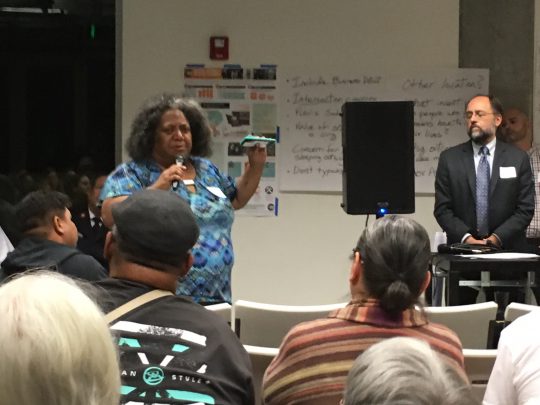
She said she heard about this and it “caught me off guard, and I thought, ‘the community needs to be part of the conversation’, but what I don’t want to see is another community like White Center to be marginalized and have a decision made without them in the room either.” She calls for a citizens’ committee to be created, and to include people experiencing homelessness. “We need to get the right people in the room to talk about this.” And, she says, she is asking that the county put a hold on the plan, “take a step back, look at it, on behalf of the homeless folks who need services all over the community.”
Ellerbrook says he will “take (Savusa) up on (the committee idea).”
We recorded the entire two and a half hour meeting on video and will add that video when it is ready, in the early morning.
7:18 AM FRIDAY: That video has now been added, atop this story.


